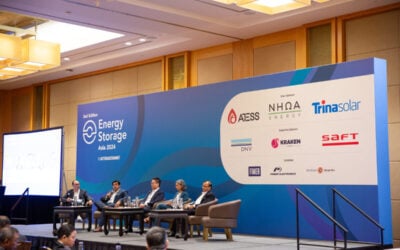Energy storage will be used to maximise the benefit of locally generated solar power, including reducing transmission losses, in a trial put together in Bavaria, Germany, by a partnership between academics, private companies and local government.
An opening event was held for the “Energy Neighbour” project this morning in Kirchdorf, Upper Bavaria. As with much of southern Germany, the area has many rooftop PV systems that produce more power than the local grid can accept. The project uses locally sited energy storage to balance the supply and demand of energy, using an eight-tonne battery system to store surplus power from the area’s rooftop PV systems and reduce the area’s reliance on trans-regional grids. By keeping the generation, storage and consumption local, the project’s partners believe it will reduce transmission losses and cause less fluctuation of power on the grid.
The 250kW/200kWh storage facility was launched today by Ilse Agnier, Bavarian state minister of economic affairs, who called the “further development of storage technologies…an important element of the energy transition”. Anger’s ministry has funded the approximately €30 million (US$34.1 million) cost of the project.
“Energy Neighbour increases the local consumption of generated power, reduces the load on the grid and facilitates the expansion of renewable energy production capacity. Bavaria is moving ahead in this project with its exemplary fostering of research”.
Try Premium for just $1
- Full premium access for the first month at only $1
- Converts to an annual rate after 30 days unless cancelled
- Cancel anytime during the trial period
Premium Benefits
- Expert industry analysis and interviews
- Digital access to PV Tech Power journal
- Exclusive event discounts
Or get the full Premium subscription right away
Or continue reading this article for free
The project was developed by the Technical University of Munich, utility Kraftwerke Haag, storage system maker VARTA Storage and the Bavarian Center for Applied Energy Research (ZAE-Bayern). It will use 13 battery modules, each of 192 cells, that are claimed to be capable of over 10,000 cycles each.
The trial is the latest, in Germany and elsewhere, to develop not just the technologies for energy storage, but also the practical applications and ultimately business models that could prove its value. German ‘100% renewable energy’ utility Lichtblick is deploying aggregated energy storage systems in “swarms”, linking them up to act in concert to provide grid services or electricity trading, in trials with Sonnenbatterie and other system makers, while ‘Strombank’, another academic trial in the State of Baden-Württemberg involving the Institute for Photovoltaic of the University of Stuttgart, is also ongoing, trialling local storage for local PV generation.





